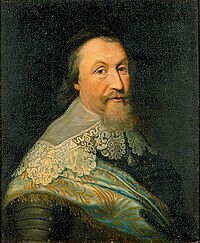Axel Oxenstierna
|
The High Well Born Count Axel Oxenstierna |
|
|---|---|
 |
|
|
Lord High Chancellor of Sweden Rikskansler |
|
|
In office 1612–1654 |
|
| Preceded by | Svante Turesson Bielke |
| Succeeded by | Erik Oxenstierna |
| Governor-General of Riga | |
|
In office 1622–1626 |
|
| Preceded by | Office created |
| Succeeded by | ? |
| Governor-General of Prussia | |
|
In office 1626–1631 |
|
| Preceded by | Office created |
| Succeeded by | Office abolished |
| Personal details | |
| Born |
16 June 1583 Fånö, Uppland, Sweden |
| Died | 28 August 1654 (aged 71) , Sweden |
| Spouse(s) | Anna Åkesdotter Bååt |
| Children | Gustaf Oxenstierna, Johan Oxenstierna, Catharina Oxenstierna, Christina Oxenstierna, Beata Oxenstierna, Barbro Oxenstierna, Åke Oxenstierna, Maria Oxenstierna, Gabriel Oxenstierna, Jakob Oxenstierna, Erik Oxenstierna |
| Residence | Tidö Castle |
| Occupation | Statesman |
| Signature | |
Axel Gustafsson Oxenstierna af Södermöre (Swedish: [ˈʊksɛnˌɧæːɳa]; 1583–1654), Count of Södermöre, was a Swedish statesman. He became a member of the Swedish Privy Council in 1609 and served as Lord High Chancellor of Sweden from 1612 until his death. He was a confidant of first Gustavus Adolphus and then Queen Christina.
Oxenstierna is widely considered one of the most influential people in Swedish history. He played an important role during the Thirty Years' War and was appointed Governor-General of occupied Prussia; he is also credited for having laid the foundations of the modern central administrative structure of the State, including the creation of counties (Swedish: län).
Oxenstierna was born on 16 June 1583, at Fånö in Uppland, the son of Gustaf Gabrielsson Oxenstierna (1551–1597) and Barbro Axelsdotter Bielke (1556–1624), as the oldest of nine siblings. His parents belonged to the ancient and influential high noble families of Oxenstierna and Bielke, both of which had held high offices in the state and the church for generations. After the death of her husband Gustaf, Axel's mother Barbro decided to let Axel and his brothers Christer and Gustaf finish their studies abroad. Thus, the brothers received their education at the universities of , Wittenberg and Jena. On returning home in 1603 he took up an appointment as valet de chambre (kammarjunkare) to King Charles IX of Sweden.
...
Wikipedia
